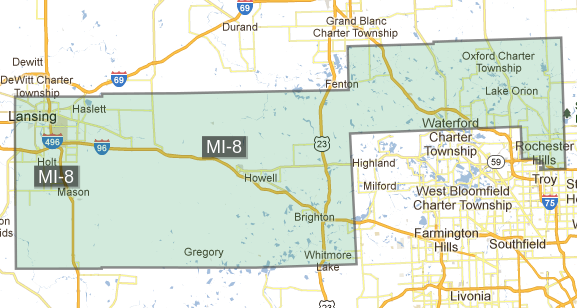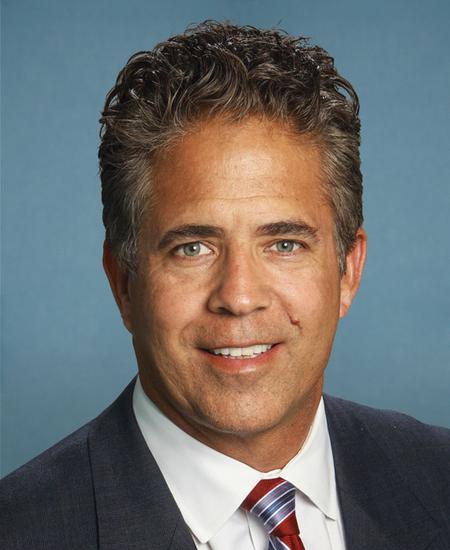Healthcare Takes Center Stage in Race For Michigan’s Eighth Congressional District
Republican incumbent Mike Bishop faces Democratic challenger Elissa Slotkin in the hotly contested race.

In Michigan’s tight race for the Eighth Congressional District, one issue taking center stage is a heated debate about the future of healthcare. Second-term Republican Mike Bishop says he advocates for an “open marketplace” where individuals can pick their own healthcare plan. His challenger, Democrat Elissa Slotkin, is offering to expand the government plan. Healthcare is a key issue in the hotly contested race.
On a sunny Saturday, a few blocks outside of Holly, Elissa Slotkin is knocking on doors introducing herself. Midway down one street, she meets Teresa Reynolds who recently moved to Holly.

Slotkin and Reynolds get to talking about the Detroit Lions and the neighborhood. When Slotkin asks what issue is most important, Reynolds doesn’t hesitate.
“Probably healthcare,” says Reynolds. “After I got a divorce I lost my healthcare. My job — there’s not enough people. I made just enough that I couldn’t get on state, but not enough to be able to afford healthcare.”
Slotkin nods sympathetically, then explains her healthcare plan.
“I would say probably more than any other issue that’s what I hear about that,” says Slotkin.
“Personally, one of the things that I support is a buy-in to Medicare, that any person at any age can buy into Medicare, have a good program at a good price and not have to be locked into their employer’s healthcare. Right.”
Slotkin is a former Obama official and CIA officer. She says healthcare was a key reason she joined the race. She says her mother struggled to pay out-of-pocket for her cancer treatments because she couldn’t afford insurance.
Michigan’s Eighth Congressional District runs from Ingham County to Livingston County and includes a section of northern Oakland County. Up until last month, polls had Congressman Mike Bishop holding a lead. But now analysts are saying the race is “a toss-up.” The district voted for President Trump in 2016 and has been solidly Republican in recent years. But this year, it’s one of the races the Democratic Party hopes to win in its effort to flip the U-S House.
On the campaign trail, Slotkin has been critical of Congressman Bishop’s 2017 vote to repeal the Affordable Care Act. The proposed replacement would have allowed states to submit waivers letting insurance companies charge higher premiums for people with pre-existing medical conditions.
Congressional data shows almost a million Michigan residents are now covered by the Affordable Care Act. More than half of non-elderly Michigan residents have pre-existing conditions.
Bishop did not respond to repeated requests for an interview with WDET. But in a debate this month on WDIV’s “Flashpoint,” Bishop defended his vote to repeal Obamacare, saying the legislation he supported accounted for people with life-long diseases.
“We have many things in place,” says Bishop, “that we voted for in that bill including a pool — a pool to help defer the cost of people with pre-existing conditions. That was part of it.”
Bishop says if Slotkin’s plan comes to fruition, and leads more people to buy into Medicare, the program would be pushed to insolvency.
“It’s doubling down on a system that already doesn’t work, he says.
“If you do that you’re going bankrupt Medicare. You’re going to jack up rates and you’re going to push people off the system.”
Bishop repeated this message in a short television ad. In it, a senior couple who are on Medicare say they would lose their coverage if Slotkin’s policy comes to fruition.
The non-partisan fact-checking site Politifact says it found no evidence to support the claim that Slotkin’s healthcare policy would affect coverage for seniors.
Political analysts closely following the Eighth Congressional District race say healthcare will likely galvanize voters in both parties to go to the polls. Susan Demas is a Democratic strategist who says many people are happy with their health insurance under Obamacare now and that may affect how they vote.
“I think healthcare is the biggest issue in this race,” says Demas.
“There are just so many people who are really energized by the cuts that Republicans have tried to pass and been successful on some fronts. You know I covered Mike Bishop during his first couple campaigns and he ran completely against Obamacare.”
But Republican strategist Steve Mitchell is skeptical that the issue will change many votes.
“The Democrats will try to make it an issue,” says Mitchell.
“They are going to try to say that Mike Bishop doesn’t believe everybody should have the right to healthcare. And so they’re going to pound him on that issue. I’m not sure how effective that will be in this district.”
Mitchell says most people who got health insurance from Obamacare or the Medicaid expansion already voted for Democrats. He says the district also has continuously elected Republican representatives for the last 17 years.
In fact, Mike Bishop was elected with a 17-point margin in 2016. That’s more than double the margin President Trump won the district by that year.
Both Bishop and Slotkin are now fighting for swing voters. The candidates’ healthcare policies may be a key factor in the final outcome on Election Day.

